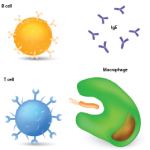TABLE 2: Approaches to Target B Cells
B cell depletion
- Rituximab (anti-CD20)
- Ocrelizumab (humanized anti-CD20) (Phase III in RA and SLE)
- Anti-CD20 (small modular immunopharmaceutical [SIMP]) (Phase III in RA)
- Ofatumumab (anti-CD20 from humanized mice) (Phase III in RA)
Inhibitory signaling
- Epratuzumab (anti-CD22) (Phase II in SLE)
Cytokine blockade
- Belimumab (anti-BAFF) (advanced development in RA, SLE)
- BR3-Fc (Phase I RA)
- Anti-BR3 (Phase I RA)
- Atacicept (TACI-Ig) (Phase I, II complete in RA and SLE)
Clinical Utilization and Safety
Given that B-cell depletion is irreversible until reconstitution occurs (and persists for long periods during which the patient may not make antibodies to infections or immunization), clinicians may be less comfortable using this therapeutic approach in RA instead of a TNF blockade, which can be stopped. However, a recent meta-analysis supports prior literature regarding the safety of B-cell depletion in that treatment of RA with rituximab was not associated with an increased incidence of serious infections, even after repeated courses, or with TNF blockade after B-cell depletion.9-11 The caveat here is that the database is relatively small for RA and even smaller for SLE. Moreover, there have been reports of fulminant hepatitis B reactivation and rare cases of PML. Thus, patients should be screened for hepatitis B prior to the use of rituximab, and viral prophylaxis should be considered in high-risk patients.
Unfortunately, there are no screening methods to identify patients at risk for development of PML. A third case of PML was recently reported in an RA patient receiving rituximab, notably without prior anti-TNF treatment or risk factors for PML development, such as malignancy or heavy immunosuppression. Although the frequency of PML in RA patients receiving rituximab is rare (3 in 100,000 patients), a recent press release from Genentech notes that the information to date suggests that patients with RA who receive rituximab have an increased risk of PML. Current U.S. Food and Drug Administration recommendations are that rituximab only be used in later-stage RA patients who have inadequately responded to anti-TNF therapy, which has been our practice to date. Given that primary and secondary immune responses may be compromised even a year after therapy, it is also recommended that immunizations be given one month prior to starting rituximab, and the yearly influenza vaccine given as late as possible after the last dose.12 This would include vaccination for the novel H1N1 virus, but avoidance of live vaccines, similar to the practice for other immunocompromised populations. I also routinely monitor serum immunoglobulin levels (yearly) given the occurrence, albeit rare, of hypogammaglobulinemia and the fact that replacement intravenous immunoglobulin can be considered in the setting of severe hypogammaglobulinemia (serum IgG<200-300 mg/dl) (see Table 3, above).
